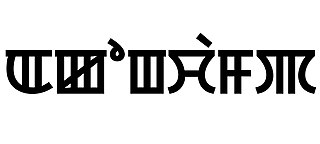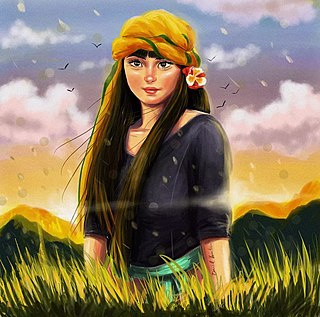
Sanamahism or Meiteism or Lainingthouism, is an ethnic religion of the Meitei people of Kangleipak in Northeast India. It is a polytheistic religion and is named after God Lainingthou Sanamahi, one of the most important deities of the Meitei faith. Sanamahi is the eldest son of the supreme god Yaibirel Sidaba and the supreme goddess Leimarel Sidabi. Traditionally every Meitei household, irrespective of the religion, worships Sanamahi and Leimarel Sidabi. The importance of Sanamahi in the religion is also emphasized in the name itself which means Liquid Gold. Sanamahism does not have a religious head but has a body, Maru Loishang that oversees the main religious activities and govern all affairs pertaining to the religion including conducts of priest and priestess. The Maru Loishang also acts a court for religious disputes. There are three main departments under the Pandit Loishang, namely, the Amaiba Loishang, the Pena Asheiba Loishang and the Amaibi Loishang. These departments have existed since the reign of King Meidingu Hongnemyoi Khunjao Naothingkhong of Manipur in 662 AD.

Imoinu or Emoinu is a goddess associated with household, hearth, family, fireplace, kitchen, wealth, peace and prosperity in Meitei mythology and religion of Ancient Kangleipak. She is frequently associated with Leimarel Sidabi. She is regarded as one of the incarnations or representations of goddess Leimarel Sidabi.

Leimarel Sidabi or Leimalel Sitapi is a goddess in Meitei mythology and the religion of Ancient Kangleipak. She is the highest female divinity in the Meitei pantheon. She is the goddess of earth, of nature and the household. She is revered as the mother of every living being in the universe.

Panthoibi, also known as Nongpok Leima, is a goddess associated with civilization, courage, fertility, handicraft, love, victory, warfare and wisdom in the mythology and religion of Ancient Kangleipak. She is a consort of the God Nongpok Ningthou. She is considered to be one of the divine incarnations of Leimarel Sidabi and is also identified as a form of Goddess Nongthang Leima. She is worshipped mainly by the Meitei people in Manipur, Assam, Tripura, Bangladesh and Myanmar.

Nongshaba, also spelled as Nongsaba, is a Lion God in Meitei religion (Sanamahism) and mythology. He is also regarded as a king of the gods. He is credited with producing light in the primordial universe and is regarded as the maker of the sun. He is worshipped by the people of both the Ningthouja clans as well as the Moirang clans. God Nongshaba was worshipped by the people of Moirang clan as a lineage deity and regarded as the father of God Thangching (Thangjing). He is the greatest of the Umang Lais in Ancient Kangleipak but he made his only son Thangching (Thangjing) the chief deity of Moirang.

Irai Leima or Ireima is a goddess in Meitei mythology and religion (Sanamahism) of Ancient Kangleipak. She is the goddess and the divine female personification of water and aquatic life. She is also considered to be the incharge of the diseases.

Phouoibi Shayon, also simply known as Phouoibi, is a 2017 Indian Meitei language mythological film, about goddess Phouoibi and other celestial fairies who came down to earth to prosper the human civilization. The film is directed by O. Samananda, starring Lilabati, Kaiku Rajkumar and Gokul Athokpam, under the collaboration of Kanglei Movies World and Sergey Film Production.

Phouoibi (Fouoibi) or Phouoipi (Fouoipi) or Phouleima (Fouleima) or Phoureima (Foureima) is the goddess and the female personification of the agriculture, crops, fertility, grains, harvest, paddy, rice and wealth in Meitei mythology and religion of Ancient Kangleipak (early Manipur). She is the lover of Akongjamba, a hero in ancient legends. But fate does not permit the lovers to unite. So, Phouoibi and Akongjamba reincarnated in the legends. She was sent by Thangching (Thangjing) to Kege Moirang (Keke Moilang) kingdom to prosper the human world. The legends of her love with Akongjamba were believed to be enacted by Thangching (Thangjing) as a part of the Epic cycles of incarnations (Moirang Saiyon) of the Moirang Kangleirol legends.
Phouoibi or Phouoipi may refer to:

Lemlei Ngaleima or Ngareima is the goddess and the divine female personification of the fishes and the aquatic life in Meitei mythology and religion (Sanamahism) of Ancient Manipur. She is a sister of the goddesses, Phouoibi, Thumleima and Ereima (Ireima).

Noinu Thumleima or Thumkhong Lairembi is the goddess of salt and salt wells in Meitei mythology and religion of ancient Manipur. She is a sister of the goddesses, Phouoibi (Phouleima), Ngaleima and Ereima (Ireima). People pray to her so there will be enough salt. Salt is an important part of the human diet.

Akongjamba was a nobleman of a King in Ancient Moirang in Meitei mythology and folklore. He was a lover of the harvest Goddess Phouoibi, but fate did not permit the lovers to unite, so they reincarnated. The lives of the two legendary lovers were believed to be enacted by Thangjing as a part of the Epic cycles of incarnations.

Thangching or Thangjing is a primordial deity in Meitei mythology and religion of Ancient Kangleipak. He is the ruling deity of the Moirang dynasty of Ancient Moirang. He rules supreme on the banks of the landlocked sea, Loktak lake. He is one of the four cardinal Umang Lais. The guardianship of the south western direction is alluded to Thangjing and the other directions to Koubru, Marjing and Wangbren.

Phou Ningthou is a deity in Meitei mythology and religion (Sanamahism) of Ancient Kangleipak. He is the God and the divine male personification of the agriculture, crops, fertility, grains, harvesting, paddy, rice and wealth. He is the consort of Phouoibi (Phouleima), the goddess of crops and agricultural fertility.
Shakuhachi meets Pena is a musical composition and performance, which is a collaboration of the performances of the traditional Japanese musical instrument Shakuhachi and the traditional Meitei musical instrument Pena. It is a maiden collaboration of traditional music between the two nations, India and Japan. It was performed by Motonaga Hiramu of Japan and Mayanglambam Mangangsana with his daughter Mangka Mayanglambam of Laihui, Imphal. It was performed at "The Giving Tree", Sangaiprou, Imphal West on the 28th of November, 2016. It was performed on the last day of a 3 day workshop on Shakuhachi conducted as a part of the "Manipur Japan Summit 2016". It was organised by the "Laihui" in collaboration with the "Art Heals Trust, Imphal, Manipur" and the "The Japan Foundation, New Delhi".

In Meitei mythology and folklore, the epic cycles of incarnations in Moirang is a cyclic epic of seven incarnations of two divine lovers in the kingdom of Moirang in the realm of Ancient Kangleipak.

The ancient legend of Kadeng Thangjahanba and Tonu Laijinglembi is one of the epic cycles of incarnations of Meitei mythology and folklore, that is originated from Moirang kingdom of Ancient Kangleipak. It concerns the fateful love of Kadeng Thangjahanba, a skilled blacksmith, for the beautiful Tonu Laijinglembi. Kadeng Thangjahanba was a highly talented and skilful royal chief metalsmith appointed by King Laijing Ningthou Punsiba of Moirang. Tonu Laijinglembi was the only daughter of Laijing Lakpa, a favourite nobleman of the King of Moirang.

Moirang Sai or Moirang Shai is a traditional Meitei musical performing art form, that narrates the story of Khamba and Thoibi. The performance timing can span over 120 hours.

The Laihui Ensemble is a centre for research on traditional and indigenous performing arts, based on Imphal, Manipur. It was established in 1985. The association is performing different art shows at different venues across different nations in the world. Mangka Mayanglambam is one of the most active artists of the ensemble, and is trying her best to revive the dying art forms of Manipur including the Moirang Sai.

Women have significant roles in different elements of Meitei culture, including but not limited to Meitei dances, Meitei festivals, Meitei folklore, Meitei folktales, Meitei literature, Meitei mythology, Meitei religion, etc.












